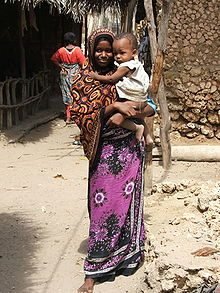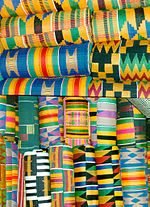Culture of Africa
The Culture of Africa is varied and manifold, consisting of a mixture of countries with various tribes that each have their unique characteristic from the continent of Africa. It is a product of the diverse populations that inhabit the continent of Africa and the African Diaspora. Generally, Culture can be defined as a collective mass of distinctive qualities belonging to a certain group of people. These qualities include laws, morals, beliefs, knowledge, art, customs, and any other attributes belonging to a member of that society. Africa has numerous ethnic nationalities all with varying qualities such as language, dishes, greetings, and dances. However, all African peoples share a series of dominant cultural traits which distinguish African Culture from the rest of the world. For example, social values, religion, morals, political values, economics, and aesthetic values all contribute to African Culture. Expressions of culture are abundant within Africa, with large amounts of cultural diversity being found not only across different countries but also within single countries. Even though African cultures are widely diverse, they are also, when closely studied, seen to have many similarities; for example, the morals they uphold, their love and respect for their culture, as well as the strong respect they hold for the aged and the important, i.e. kings and chiefs.
Africa has influenced and been influenced by other continents. This can be portrayed in the willingness to adapt to the ever-changing modern world rather than staying rooted in their static culture. The Westernized few, persuaded by American culture and Christianity, first denied African traditional culture, but with the increase of African nationalism, a cultural recovery occurred. The governments of most African nations encourage national dance and music groups, museums, and to a lower degree, artists and writers.
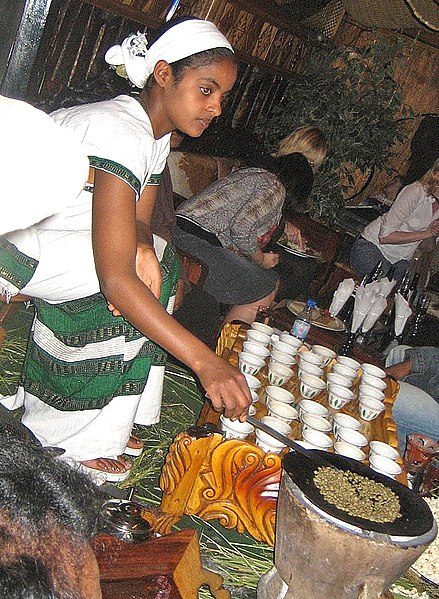
African arts and crafts

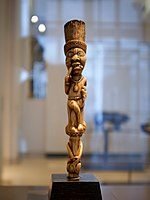
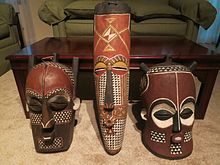
Africa has a rich tradition of arts and crafts. African arts and crafts find expression in a variety of woodcarvings, brass and leather artworks. African arts and crafts also include sculpture, paintings, pottery, ceremonial and religious headgear and dress. Maulana Karenga states that in African art, the object was not as important as the soul force behind the creation of the object. He also states that All art must be revolutionary, and in being revolutionary, it must be collective, committing, and functional.
BaKongo masks from the Kongo Central region
Certain African cultures have always emphasized personal appearance, and jewelry has remained an important personal accessory. Many pieces of such jewelry are made of cowry shells and similar materials. Similarly, masks are made with elaborate designs and are an important part of some cultures in Africa. Masks are used in various ceremonies depicting ancestors and spirits, mythological characters, and deities.
A terra-cotta head sculpture (1100-1500) of the Yoruba, showing extraordinary naturalism. This head represents the oni or king of Ife.
In many traditional arts and craft traditions in Africa, certain themes significant to those particular cultures recur, including a couple, a woman with a child, a male with a weapon or animal, and an outsider or a stranger. Couples may represent ancestors, community founders, married couples, or twins. The couple theme rarely exhibits the intimacy of men and women. The mother with the child or children reveals the intense desire of the women to have children. The theme is also representative of mother mars and the people as her children. The man with the weapon or animal theme symbolizes honor and power. A stranger may be from some other tribe or someone from a different country, and a more distorted portrayal of the stranger indicates a proportionately greater gap from the stranger.
Clothes
The Culture of Africa is varied and manifold, consisting of a mixture of countries with various tribes that each have their unique characteristic from the continent of Africa. It is a product of the diverse populations that inhabit the continent of Africa and the African Diaspora. Generally, Culture can be defined as a collective mass of distinctive qualities belonging to a certain group of people. These qualities include laws, morals, beliefs, knowledge, art, customs, and any other attributes belonging to a member of that society. Africa has numerous ethnic nationalities all with varying qualities such as language, dishes, greetings, and dances. However, all African peoples share a series of dominant cultural traits which distinguish African Culture from the rest of the world. For example, social values, religion, morals, political values, economics, and aesthetic values all contribute to African Culture. Expressions of culture are abundant within Africa, with large amounts of cultural diversity being found not only across different countries but also within single countries. Even though African cultures are widely diverse, they are also, when closely studied, seen to have many similarities; for example, the morals they uphold, their love and respect for their culture, as well as the strong respect they hold for the aged and the important, i.e. kings and chiefs.
Africa has influenced and been influenced by other continents. This can be portrayed in the willingness to adapt to the ever-changing modern world rather than staying rooted in their static culture. The Westernized few, persuaded by American culture and Christianity, first denied African traditional culture, but with the increase of African nationalism, a cultural recovery occurred. The governments of most African nations encourage national dance and music groups, museums, and to a lower degree, artists and writers.
